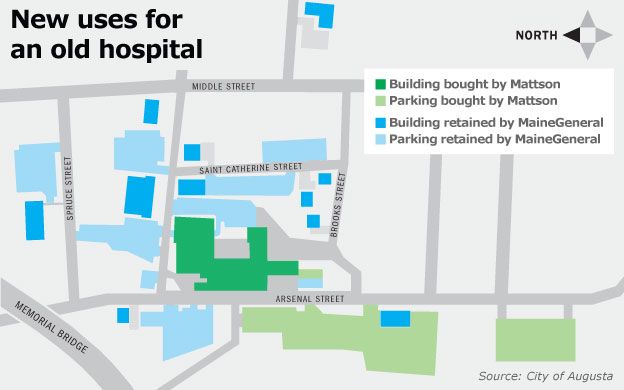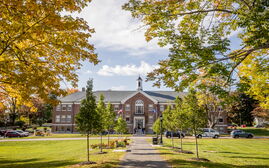Augusta hospital redevelopment targets commercial market

In most real estate markets, an abandoned hospital building would be a white elephant, or, at best, an odd duck. Case in point: The former Bath Memorial Hospital building, which has not been a hospital for more than decade, was recently sold by the city for $799,000 to a developer, igniting a controversy about the sale price that's under investigation by a former judge.
But in Augusta, Kevin Mattson, principal of Mattson Development, has a plan for reusing some mammoth space that will shortly become available as MaineGeneral Health completes its consolidation of scattered facilities into a new $322 million regional hospital in North Augusta slated to open Nov. 9. The consolidation will create 300,000 square feet of vacant space in the old MaineGeneral Medical Center that Mattson intends to redevelop, a project with expected repercussions on commercial properties throughout the capital city.
“He's definitely positioned himself as the low-cost space provider in the area,” says Chris Paszyc, a partner in CBRE|The Boulos Co. in Portland, of Mattson's efforts in Augusta. Paszyc presented the Central Maine Market forecast for 2013 at the annual Maine Real Estate and Development Association conference, and the soon-to-be-vacant hospital was one of the discussion points.
Paszyc said it could take 10 years to fully reuse the building — Mattson thinks he can do it in five to seven — and that there are reasons to think the effort could be characterized as a gamble.
“Most of the commercial growth in Augusta has taken place in the civic center area, out by the new hospital. That's become the center of gravity,” he says.
But Mattson is clear-eyed about the redevelopment of the medical center, acknowledging it's a challenge to redevelop a 115-year-old building that has only been a hospital and is situated in a largely residential neighborhood. Likewise, Augusta is one of the state's smaller urban markets for commercial space, with most business activity revolving around state, county and municipal government rather than private firms.
But Mattson is also convinced the site has assets.
“It has lots of frontage on the Kennebec River near the heart of downtown,” he says. “There are 600 parking spaces, and it's an immaculately maintained building without any structural problems.”
He also has experience on his side. Eight years ago, he redeveloped the former Digital plant — a similarly sized space — into offices that were fully leased in two years.
“People told me I was crazy to buy it,” he says of the former manufacturing space. In many ways, he expects the redevelopment of the medical center complex will be easier.
Stepping in
Mattson came to own the parcel in a circuitous way. Parent company MaineGeneral Health tried to sell the medical center two years ago, after it completed plans to consolidate it with two facilities in Waterville — the Seton Unit, a former Catholic hospital, and the Thayer Unit, an in-patient service center. There were no takers.
After an on-line auction earlier this year, Mattson emerged as the only qualified bidder. Mattson Development paid $2.5 million for the complex in January, but offset some of the acquisition cost through an agreement with MaineGeneral Health, which is paying $1 million to rent the building for the year while it completes its consolidation project.
Additionally, the medical corporation has contracted to occupy 70,000 square feet of the 300,000-square-foot building, mostly on the lower two floors, centralizing operations of a dozen or so locations it occupies in the greater Augusta area.
“Without that commitment, the numbers don't work,” Mattson says.
In return, the MaineGeneral Health gets out from under maintaining a building it doesn't need, without the necessity of a complex, multi-million-dollar demolition project, he points out. Estimated lease rates are in the $16 per-square-foot range.
It makes sense that the building will still be used for medical purposes, says Keith Luke, deputy director of economic development for Augusta, who sees the hospital campus in a broader perspective. Counting the still-vacant Kennebec Arsenal property to the south and the City Hall-Fort Western site to the north, he sees the old hospital as the hub of growth on the city's East Side.
The reason, in part, is “the tremendous expansion of medical services” represented by the new hospital, he says.
“There's a strong sense here that having the most up-to-date hospital in the state will be a tremendously positive development, though we can't see yet how that will manifest itself,” Luke says. “I would characterize the feeling as anxiety, but in a positive, not a negative, sense.”
Luke said that there's far more building activity in Augusta right now than since before the 2008 recession, including the $322 million hospital project and a $52 million addition to the Kennebec Courthouse, housing both Superior and District courts, which will be completed by December 2014.
Meanwhile, Summit Natural Gas of Maine and Maine Natural Gas have been digging up roads and building gas pipelines throughout the city that are now serving major government and private buildings, and will be extended to most residential areas by 2015.
“That's a competitive advantage for business we lacked until now,” Luke says.
While Paszyc says he knows some of his commercial clients wouldn't want to be east of the river, he does see its promise. Eventually, the former hospital complex could be seen as an extension of the old AMHI campus that now dominates the East Side, and which has been partially converted into state offices.
“I can see growth in that campus as the state continues relocations,” Paszyc says, referring to the state's trend to lease office space when it's cheaper than owning buildings outright. Currently, Class A office space leases in the $12-$14 per square foot range, while medical office space leases from $17 to $25 per square foot, depending on the fit-up, he says.
Mattson says he will definitely push for state leases in the redeveloped hospital, reasoning that he can provide space at about 30% less than the state can renovate and reoccupy space on its own.
“There's really no reason for the state to own most of the space it occupies. If there are public and historic reasons to maintain ownership” — the State House is an obvious example — “then it may be worth the cost,” he says. “But leased space is usually a better deal for everyone, including the taxpayer.”
Mattson points out that leased space is also much more popular with city government, because it receives taxes on property that would otherwise be exempt if the state owned it. To support the medical center redevelopment, the city approved a $23 million tax increment financing deal. Initially, the city will return 100% of property taxes to Mattson, a percentage that decreases to 50% over the 20-year life of the agreement as more space is occupied.
Luke thinks Mattson's focus on state leases is smart, and that health-related agencies are the most likely candidates.
“It's a medical area now, and that's likely to continue to be its strength,” he says. “The spin-offs from hospitals and physician practices are significant. I wouldn't be surprised to see health care [uses] dominate the building in the future as it has in the past.”
A model to the north
Mattson believes he has a model for the hospital renovation in one of the largest projects he's undertaken to date — the Central Maine Commerce Center in North Augusta, a mile north of the Augusta Civic Center on Route 27. It was the old Digital Equipment Corp. computer chip plant, built in 1979 at the peak of a manufacturing boom, which closed in 2003 as chip-making migrated overseas.
There are some striking similarities. The Digital plant, like the hospital, was huge for the market – also about 300,000 square feet. And no one really knew what to do with a former manufacturing plant of that size.
It is a massive structure on a single floor, built halfway into the ground as an energy-saving measure, with skylights providing the only natural light in much of the space.
Mattson bought the building for $4.5 million and reopened it in 2004. Within two years, it was fully leased to state and federal government tenants, plus a smattering of private firms, most of them doing business with the state. It is now valued at close to $50 million.
In several respects, Mattson thinks it will be easier to fill the hospital building than the old Digital plant.
“It's much closer to the center of town. It's on multiple floors, so there are lots of windows, and some great [river]views from the top floors,” he says.
He also expects a quicker turnaround time for potential lessees because the former hospital is well maintained.
“If you're starting from scratch, it might take two years to offer a completed space,” Mattson says. “We should be able to do it in 90-120 days.”
Mattson has made a career over the past decade of taking over unwanted buildings and trying to make them work again. Some projects — such as the abandoned mill buildings on Saco Island — have proceeded slowly. Others, such as the Commerce Center and the old Hallowell House hotel, occupied by the Public Utilities Commission and Efficiency Maine, have had quicker success.
He's learned some painful lessons from the 2007 real estate crash that bankrupted many developers and drove Mattson himself, he candidly admits, to the brink. He refers to the experience, only half-jokingly, as “unspeakable torment.”
“Never again will we invest in buildings where we're bearing all the operational costs,” he says, citing the importance of the hospital's lease-back.
“What saved us during the recession was that we had great tenants, who paid on time and in full. They kept us afloat,” he says. “But it was close.”
Read more














Comments